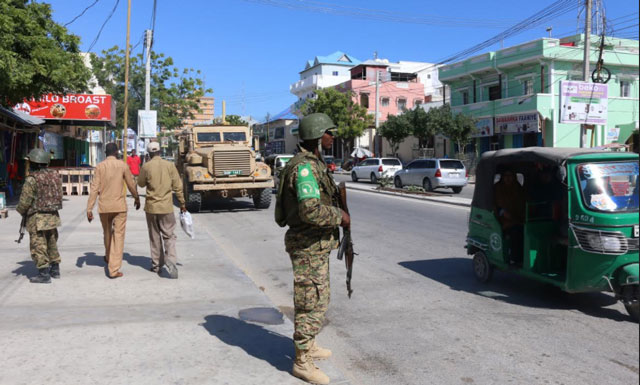
Weaknesses and complications
Then there are the Americans. According to Muhanga, the attitudes of Americans and their poor understanding of the country’s internal dynamics have complicated the peacekeeping mission. Due to their enormous resources, he says, American forces are able to conduct missions such as training of local Somali forces which may not work well with AMISOM’s set up.
He describes incidents like when the American forces trained a local Somali squad and, possibly to show off their achievement, asked President, Mohamed Abdullahi to allow them, with back-up from the Somali National Army, to take on what they thought was al Shabaab. Muhanga advised against the venture but he was over-ruled. He was, however, vindicated when the government forces were repulsed and hit terribly by one of the clans whose fighters felt the combination of forces was invading their territory.
“The Somali National Army cannot hold defensive ground,” Muhanga says.
Conversations with other UPDF soldiers in Mogadishu shed light on an army that if left to its own devices would be overrun by the Al Shabaab within no time. The Somali National Army weakness is, arguably, the biggest impediment to the withdrawal of the AMISOM force.
Yet UPDF will not stay in Somalia forever. That is the point Brig. Richard Karemire, the UPDF Spokesperson, made to The Independent after the truck bomb blast in Mogadishu in October last year. He said, however, the UPDF pull-out from Somalia would be gradual.
“This is a calculated handover of different proportions to the Somali military forces,” he said, “It is not a reckless handover.”
Around the same time, a highly placed military source told The Independent in an interview that they had in various meetings advised the AU and UN against the looming exit of UPDF in view of the strategic weaknesses of the Somali Army. “`Whom are you handing over to?’ we asked them,” the source said, “We instead requested for more troops not an exit.”
He said the local force is not up to the task and AMISOM is doing everything.
“If the exit happens, they will just be handing over to Al Shabaab,” he said adding that the Somali forces need more years of training before they can take over.
The various forces engaged in Somalia have all put up efforts to train the Somali army but since the Americans started their own training, the process has been tricky.
International community
The role of the international community in Somalia is a big issue. As a state under reconstruction both politically and economically, it has become like a piece of pie with various international players trying to either support or control. Away from the Americans, the Middle-East powers are vying for supremacy.
The oil rich House of Saudi is said to be ready to pour investment in Somalia. But there is a problem. Turkey and Qatar; who are on the same side in the Qatar-blockade in the Gulf region, already have massive investments in the country. Turkey has put up an airport terminal, hotels and some educational institutions. The Saudis are now demanding that Somalia kicks out Qatar and Turkey and joins the Saudi-led blockade of Qatar imposed last year. The Saudis are backed by Egypt.
When The Independent asked President Mohamed Abdullahi Mohamed during an interview at State House Somalia on how he manages to keep at bay the various forces trying to dictate the future of his country, he sought to reassert the sovereignty of Somalia.
“As a country that is trying to get back on track, we know various forces may want to intervene but we are always firm and remind them that Somalia is a sovereign country which can manage its own affairs,” he said.
Meanwhile, the UPDF mission in Somalia remains critical to President Yoweri Museveni and the high level deployment there signals his intent. Former AMISOM Force commander, Maj. Gen. Nathan Mugisha, is Deputy Ambassador of Uganda to Somalia; a position he has served in for five years now. Muhanga’s next deployment is at the Second Division of the UPDF which is headquartered in Mbarara, western Uganda. And his successor in Somalia, Brig. Lokech is also serving his second tour of duty. He was the commander, way back when Muhanga was deputy. Clearly, experience is critical in this delicate mission.
 The Independent Uganda: You get the Truth we Pay the Price
The Independent Uganda: You get the Truth we Pay the Price



